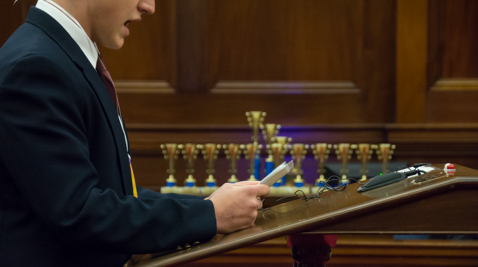
ANNAPOLIS — One by one, 13 nervous teens made their way to the front of a full courtroom.
For each of them, this was not their first time in front of a judge.
However, this time was different—this time they came not as juvenile offenders, but as invited guests.
The Department of Juvenile Services, partnered with the Maryland State Department of Education, hosted its 20th annual oratory competition Wednesday.
The 13 youths – 11 boys and two girls – came from across Maryland to compete in this final level of the competition after being selected as finalists from their respective detention facilities.
With their suit jackets, bowties, and neatly combed hair, the kids were dressed to a teenage version of the nines.
They sat in a long row of chairs behind the podium, facing their audience. To their left, a group of 13 trophies, 10 small and three larger ones for top finishers, were waiting.

Family members, teachers and other supporters gathered at the Court of Appeals in Annapolis to attend the event, presided over by Judge Clayton Greene Jr.
Each was tasked to write a 3-5 minute essay inspired by the poem, “Myself,” written by British-born American poet Edgar Albert Guest and published in 1931.
Three contest judges would then score speakers based on development of theme, clarity, poise, projection and flow.
While a major message of the poem is self-respect, each of the youths was able to relate to Guest’s words in his, or her, own unique way.
“Anyone who has a conscience will remember the hurtful things they have done to others. I think this is what the poem means by ‘I don’t want to stand with the setting sun, and hate myself for things I’ve done,’” said Jeff, a 17-year-old from Green Ridge Youth Center in Allegany County. Contestants’ last names are not being published, at the request of officials, because they are juvenile offenders.
“I think about the bad things I’ve done before I go to sleep at night and I have regrets. … I want to be able to like myself, so in the future I will make different choices. I want to stand with the setting sun at the end of my life and respect myself for the things I’ve done.”
Jeff’s father came to the competition to hear the speech. He said this was the first time he felt proud to come to court in support of his son.
A few teens spoke about getting involved with selling or doing drugs; one shared his memory of being incarcerated on his 16th birthday.
Another speaker acknowledged that his reason for wanting to change was to be a better father to his young son.
“They thought a great deal about this poem and what it meant to them,” said Greene.
“I thought it was wonderful that these young folks had an opportunity to think about where they are in their lives, mistakes that they’ve made, ways in which they can overcome their mistakes … and where they’d like to be and what they’d like to do in the future.”
The Department of Juvenile Services is an executive agency tasked with supervising the treatment of youths who enter the juvenile justice system in Maryland.
“This competition fits right in with their curriculum in school—their writing skills, learning to speak well and present,” said Eric Solomon, Department of Juvenile Services spokesman.
“And then deeper, they are learning to analyze someone’s poem and internalize it with their own story. I think that’s the best rehabilitation there is.”
The Department of Juvenile Services provides other developmental opportunities for young offenders.
Facilities offer instruction in woodworking, screen-printing and ceramics. Some teens also volunteered with Habitat for Humanity, Solomon said.
“We try to get them involved with a lot of things so they can see not just what’s inside their facilities—but what’s outside,” Solomon said. The oratory contest falls in line with this part of the Department of Juvenile Services’ mission.

Although Greene made sure to emphasize his congratulatory remarks were for all 13 participants, who would each take home a small trophy for making it to this level, there would be only one winner.
This year, that winner was 17-year-old Wayne from Baltimore, who related Guest’s poem to that of Maya Angelou’s “I Know Why the Caged Bird Sings.”
“I see worth in myself. A young man who can change. Making that change means my thinking has to change,” Wayne said in his speech.
“I don’t want to be a self-made carbon copy of what people think I am because I am caged. My mind is not caged.”
Although he was excited to win, Wayne was not entirely surprised.
“I was confident when I came because I was born with the gift of gab,” Wayne said.
“I had the mindset that I would win.”
He was also quick to thank his schoolteachers for helping him practice and perfect his winning speech.

Almost as quickly as this group of strangers came together to share some of their most vulnerable feelings and experiences, they left to go back in their separate directions—back to their detention facilities to serve the remainder of their sentences.
Whether their inspirational, hopeful, motivational speeches will translate into real actions is up to them.
“As I told (the kids), success just doesn’t happen. You have to work for success. You have to be prepared, you have to be determined, you have to be disciplined—and there has to be an opportunity,” said Greene.
“And today was their opportunity to shine.”


You must be logged in to post a comment.